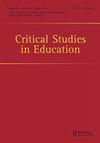Racialized retellings: (Un)ma(r)king space and place on college campuses
IF 2.7
2区 教育学
Q1 EDUCATION & EDUCATIONAL RESEARCH
引用次数: 5
Abstract
ABSTRACT In higher education, the place of the college campus, as a site of experiences, histories, symbols, and encounters, has important implications for student outcomes. However, the place of campus is often treated as a static or neutral site – a black box within which student outcomes such as belongingness occur. This article argues that excavating the encounters and memories around campus monuments can serve as an entry point for unfolding how systems of colonization and white supremacy persist in higher education, offering a critical re-imagining of the concept of belongingness. Guided by McKittrick and Massey’s feminist decolonial spatial theories and Barad’s conceptualization of memory and re-membering, the article excavates two campus monuments: a boulder commemorating confederate soldiers and a clocktower honoring the legacy of the first Black students at the University. These monuments are memory objects, memorializing particular moments in time on campus, and thus becoming part of the current reproductions of place. Through tracing the memories of campus monuments into the entanglements of the present climate of higher education, this article offers implications and considerations for institutions grappling with their history and responsibility to the past.种族化的复述:在大学校园里占据了绝对的空间和位置
在高等教育中,大学校园作为经历、历史、象征和相遇的场所,对学生的学习成绩有着重要的影响。然而,校园通常被视为一个静态或中立的场所——一个黑盒子,学生的归属等结果就发生在这个黑盒子里。本文认为,挖掘校园纪念碑周围的遭遇和记忆,可以作为揭示殖民和白人至上制度如何在高等教育中持续存在的切入点,为归属感的概念提供了批判性的重新想象。在McKittrick和Massey的女权主义非殖民化空间理论和Barad的记忆和回忆概念的指导下,文章挖掘了两个校园纪念碑:一个纪念邦联士兵的巨石和一个纪念大学第一批黑人学生遗产的钟塔。这些纪念碑是记忆的对象,纪念校园里的特定时刻,因此成为当前地点复制品的一部分。通过追溯校园纪念碑的记忆到当前高等教育环境的纠缠,本文为努力解决其历史和对过去的责任的机构提供了启示和考虑。
本文章由计算机程序翻译,如有差异,请以英文原文为准。
求助全文
约1分钟内获得全文
求助全文
来源期刊

Critical Studies in Education
EDUCATION & EDUCATIONAL RESEARCH-
CiteScore
10.10
自引率
5.10%
发文量
18
期刊介绍:
Critical Studies in Education is one of the few international journals devoted to a critical sociology of education, although it welcomes submissions with a critical stance that draw on other disciplines (e.g. philosophy, social geography, history) in order to understand ''the social''. Two interests frame the journal’s critical approach to research: (1) who benefits (and who does not) from current and historical social arrangements in education and, (2) from the standpoint of the least advantaged, what can be done about inequitable arrangements. Informed by this approach, articles published in the journal draw on post-structural, feminist, postcolonial and other critical orientations to critique education systems and to identify alternatives for education policy, practice and research.
 求助内容:
求助内容: 应助结果提醒方式:
应助结果提醒方式:


